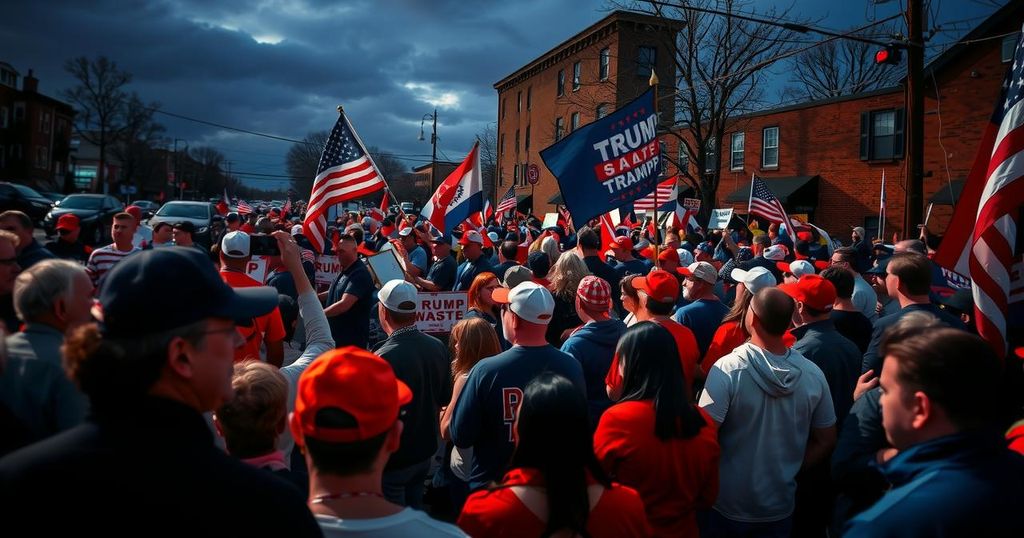Northeast Philadelphia saw increased support for Donald Trump in the 2024 election, despite Democratic domination in voter registration. Individuals like Mary Ann Becker and Patrick Corey articulated economic and security concerns that motivated their votes. With over 136,700 votes for Trump in the city, Republican sentiments are shifting, indicating potential developments in local political dynamics as the GOP navigates an evolving voter landscape.
In the 2024 presidential election, Northeast Philadelphia emerged as a significant area for Trump supporters, despite the city’s overall registration favoring Democrats. Voter enthusiasm, particularly among older residents, played a pivotal role in Trump’s performance, as seen in the experiences of individuals like Mary Ann Becker and Patrick Corey. They and others expressed worries over economic challenges and security issues that motivated their backing for Trump, signaling a notable Republican voter base in predominantly blue areas of Philadelphia. Preliminary data indicated that while Trump won the Philadelphia popular vote, Democrats still substantially outnumber Republicans within the city. The shifting demographics and evolving political landscape raise questions about the future direction of the local GOP and its ability to resonate with younger and more diverse voter segments. Philadelphia’s political landscape illustrates ongoing divisions within urban areas. Despite registered Democrats outnumbering Republicans by a large margin, the appeal of Trump’s policies among certain demographics suggests a complex political allegiance. Observations made by both long-term residents and new voters reveal discontent with the status quo, focusing on economic difficulties and perceived government failures. As the Republican Party faces an uphill battle for relevance, its leaders acknowledge the changing demographics as a challenge. According to Vince Fenerty, Philadelphia GOP chairman, while the city remains a Democratic stronghold, he takes pride in the recent electoral gains, echoing sentiments from voters who express loyalty to Trump. Their concerns about healthcare costs and border security reflect broader national issues that could influence the future of political engagement within Philadelphia’s diverse neighborhoods. Cruz, a local business owner and independent voter, articulates apprehensions regarding the rising costs of living and the government’s immigration policy, emphasizing a desire for effective governance that addresses these long-standing problems. His commentary encapsulates the shared frustrations resonating within many voters who feel they straddle the line between traditional party loyalties and the urgent need for pragmatic solutions. Thus, as we look forward, Philadelphia’s voting trends in the 2024 election suggest potential shifts in local political dynamics. Amidst a backdrop of economic challenges and evolving demographics, the Republican Party’s increasing visibility in an overwhelmingly Democratic city could shape future electoral strategies. By recognizing and addressing the specific concerns of various voter groups, local Republicans can aim to strengthen their influence and foster a more inclusive political dialogue.
The article discusses the results of the 2024 presidential election in Philadelphia, highlighting how, despite the strong Democratic majority, Donald Trump garnered significant support in the city. The piece focuses on individual voters’ experiences and sentiments, revealing the challenges they face concerning the economy, healthcare, and immigration. The article also touches on the broader implications for the Republican Party in a city mostly dominated by Democrats, showcasing both optimism and concern over changing political alignments and the interests of various demographic groups. Through firsthand accounts, it illustrates the complex realities of urban voting behavior in Philadelphia.
The 2024 election results signal a notable uptick in Republican support within Philadelphia, particularly amongst older voters who cite economic and security concerns as their primary motivations for aligning with Trump. As the city continues to evolve demographically, the Republican Party faces both obstacles and opportunities in appealing to a broader voter base. Moving forward, addressing the specific needs of diverse communities may enhance the GOP’s chances of making further inroads in this predominantly Democratic stronghold. The voices of concerned citizens illustrate a pivotal moment for all political parties as they navigate the changing landscape of urban America.
Original Source: whyy.org






